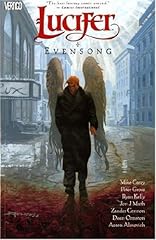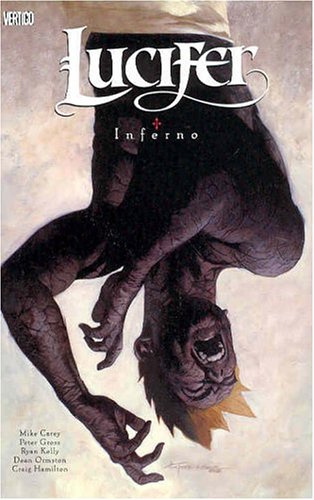
Lucifer Vol. 11 - Evensong
By Mike Carey, Peter Gross, & Ryan Kelly
And so Mike Carey's acclaimed series comes to a close. Please allow me to cut to the chase: No, Lucifer is not the second coming of Sandman (though to Carey's credit, I'm sure that was never his intention; he forged his own path). Yes, it may have been overpraised. No, it's not at all bad, though at times it's disappointing. Yes, it is good, and at times very good indeed.
Lucifer was an uneven experience, burdened by storytelling problems noted in other posts and a clear case of filler-itis. Between this and Volume 10, however, it ends on a strong note. As expected, this was an extended coda. Character arcs come to a close, the story reaches an end -- yet one that feels like a beginning -- and all that stuff set into motion so long ago is wrapped up nice and tight, turning Lucifer into a neat little package.
I liked it. With caveats.
The inclusion of a 48-page one-shot at the end of the volume does feel out of place, though. It's an okay story, nothing special, but that's not the problem here. It's the placement. Being placed after the final issue feels wrong somehow. The series' grand saga ends on a great note and then, oops, one more thing to read. It takes away from the power of the saga's end.
Overall, though, I find myself forgetting my earlier misgivings and walking away from Lucifer very satisfied. This last volume has some fine little stories and does a good job of closing the door on the series.
Sure, Lucifer wasn't quite the foray into brilliance many have said -- it was an inconsistent reading experience, its excellent highs often marred by muddy, boring lows -- but looking at the big picture, the total package is worth praising thanks in large part to an excellent close. Carey pulled it together in the end. Had the last two volumes not done such a good job of retroactively making all that came before relevant and worthwhile, I'd suggest a pass on this series. Instead, I'd say this is worth reading if you like the magic/religious/mythology wing of the Vertigo Building (which I do), just as long as you know it's at times inconsistent.
And none of this is to suggest that Mike Carey is anything less than a real talent, because let me tell you, when this guy is on, he's ON.
An earlier version of this review was originally posted at IMWAN.com.
Read my regular, everything-and-anything (usually on writing and music) blog right over here.














